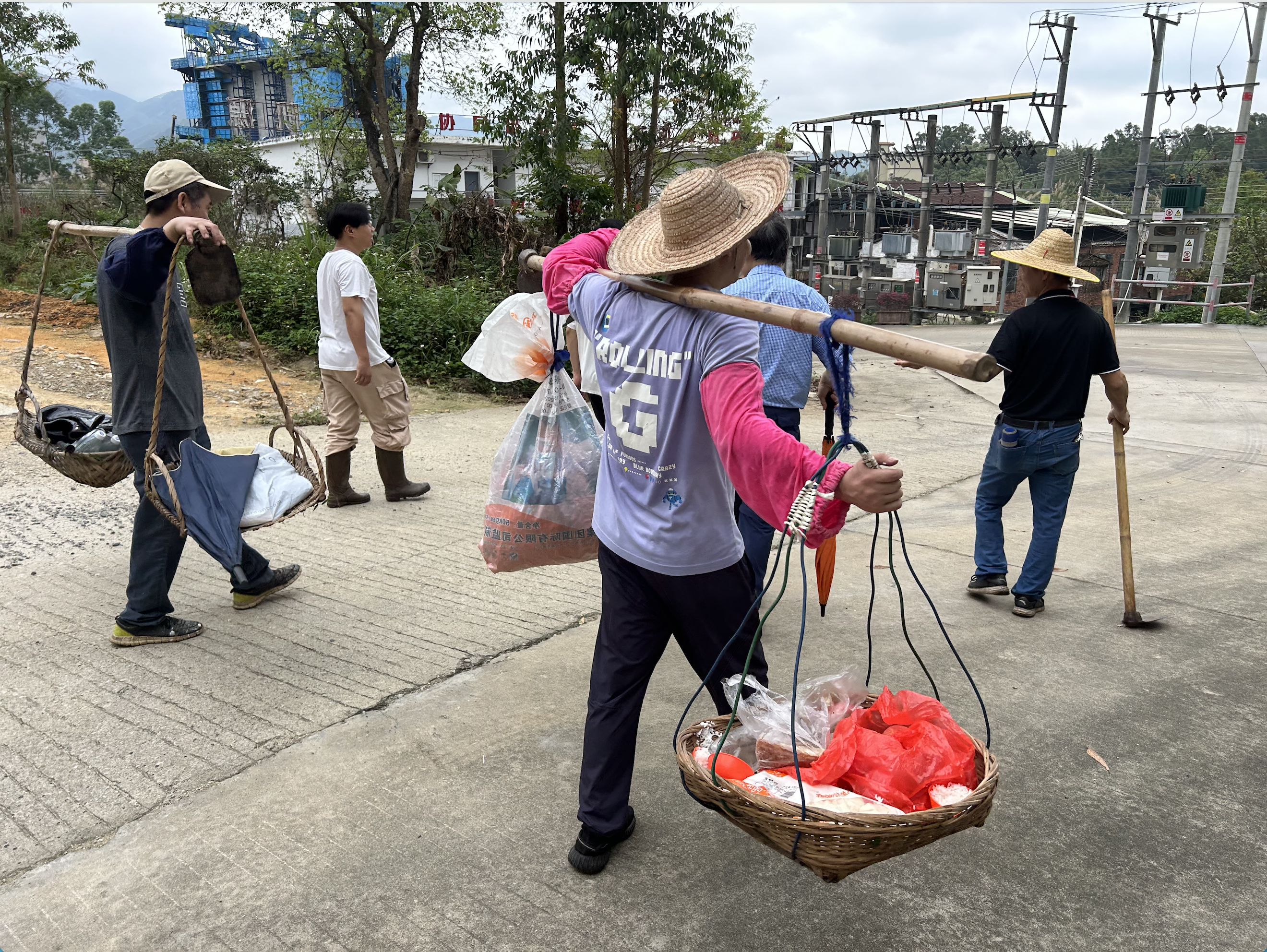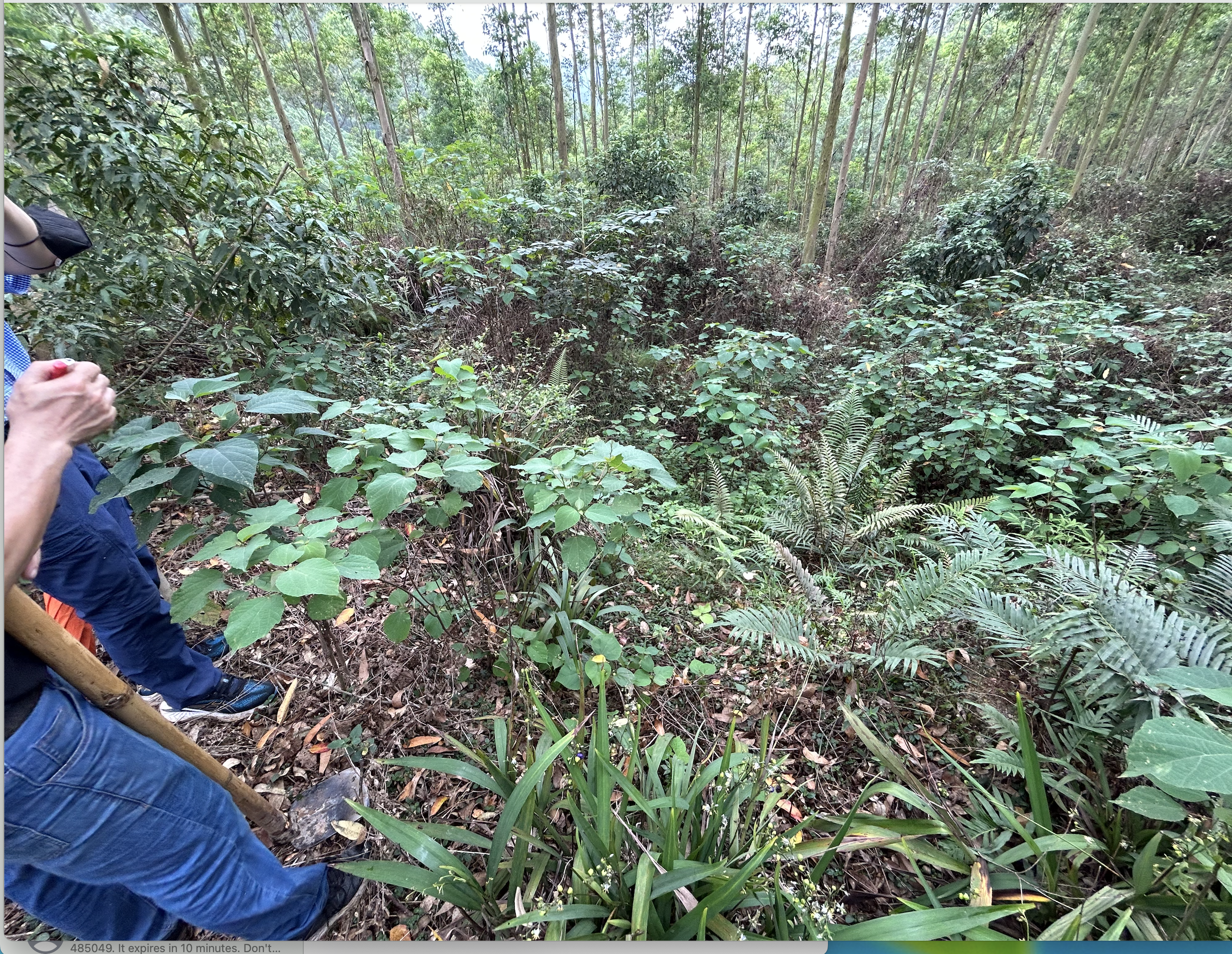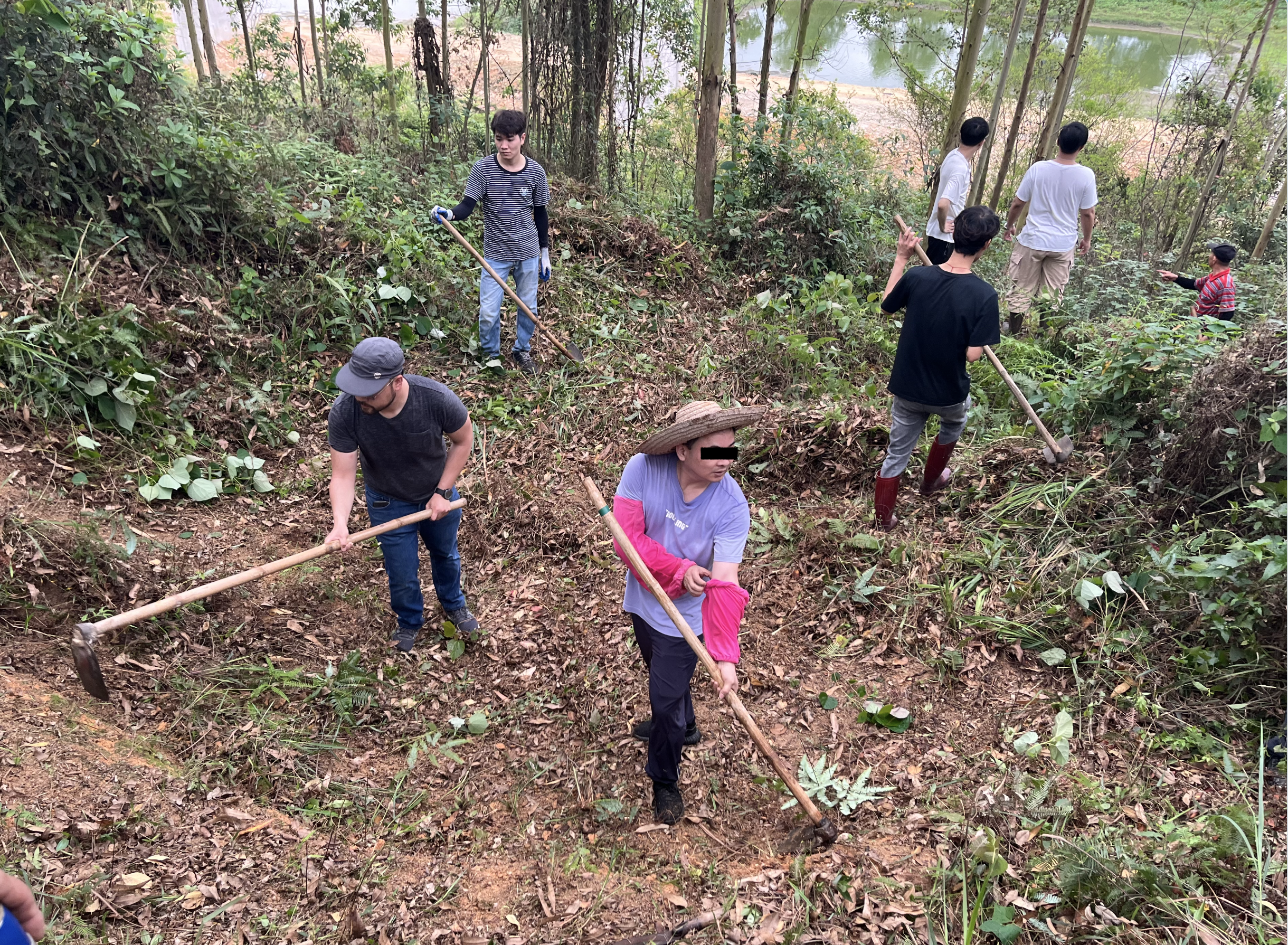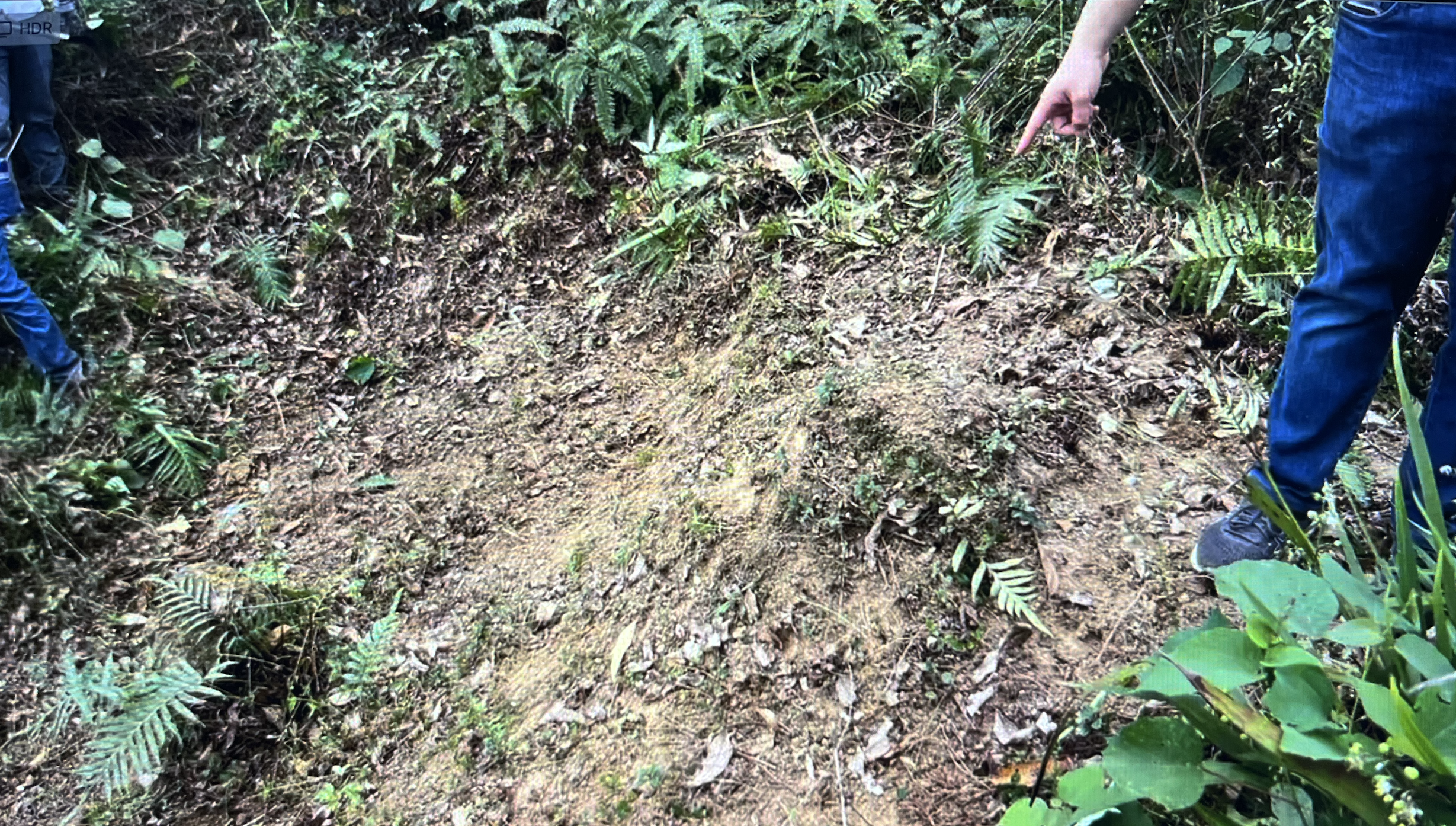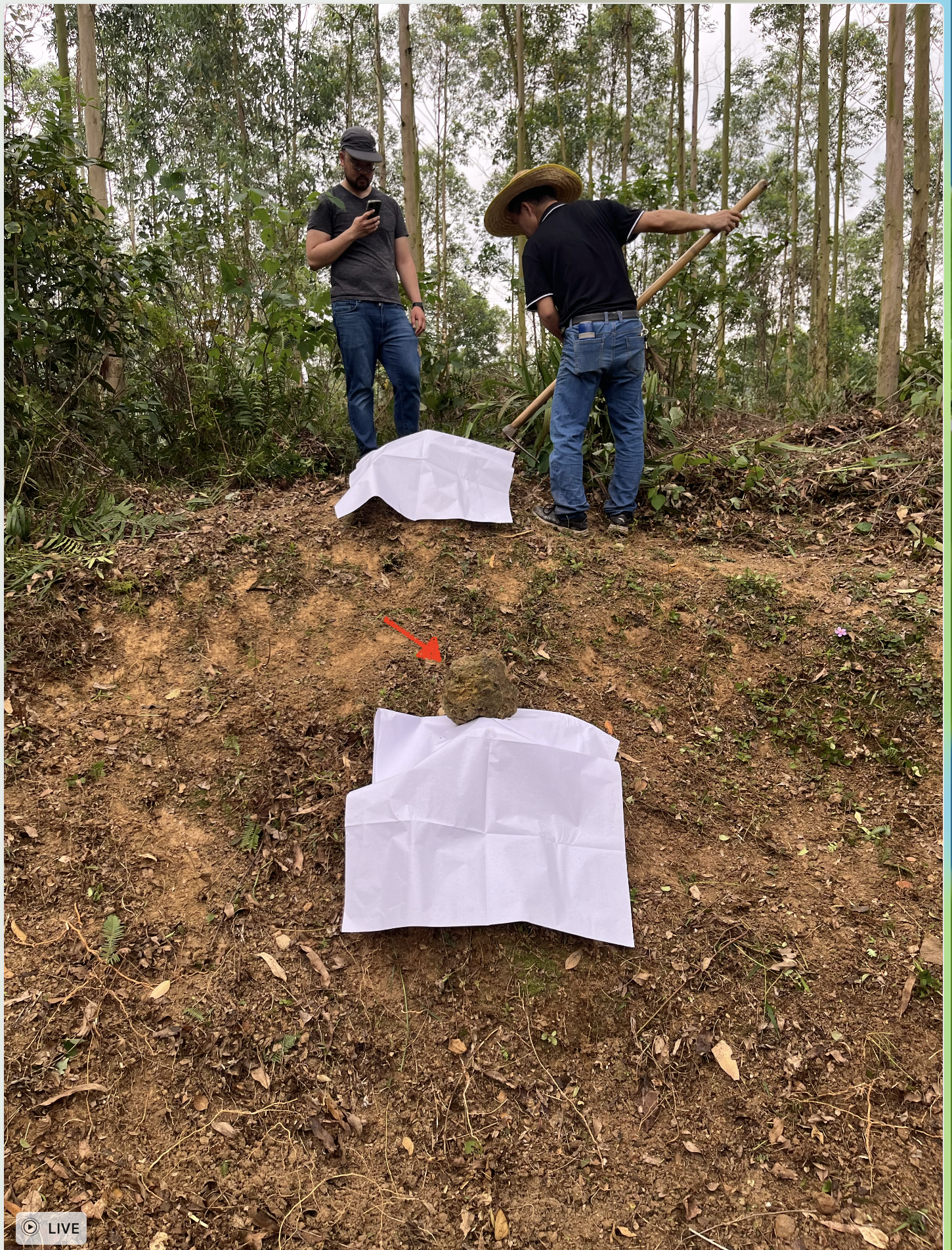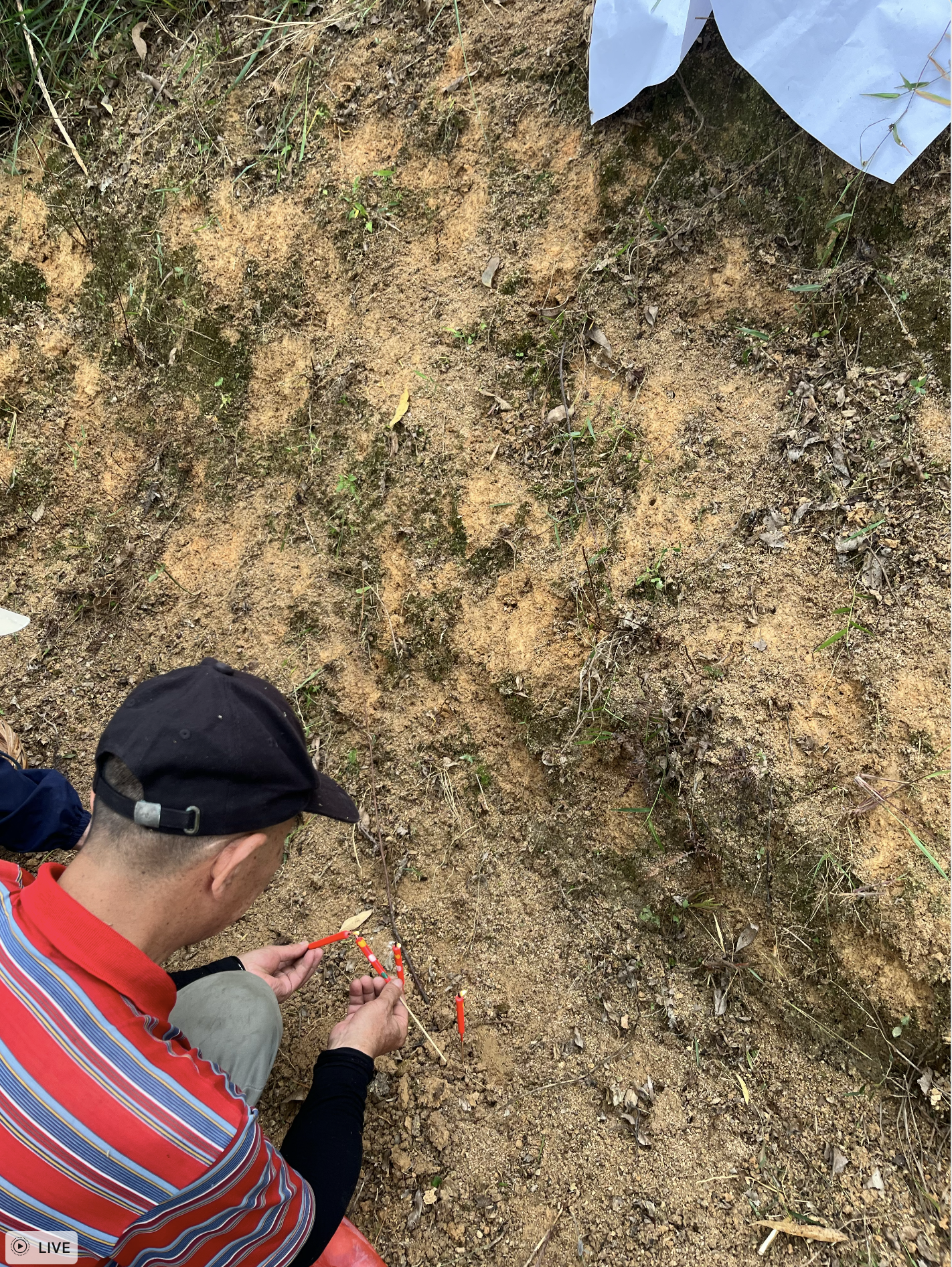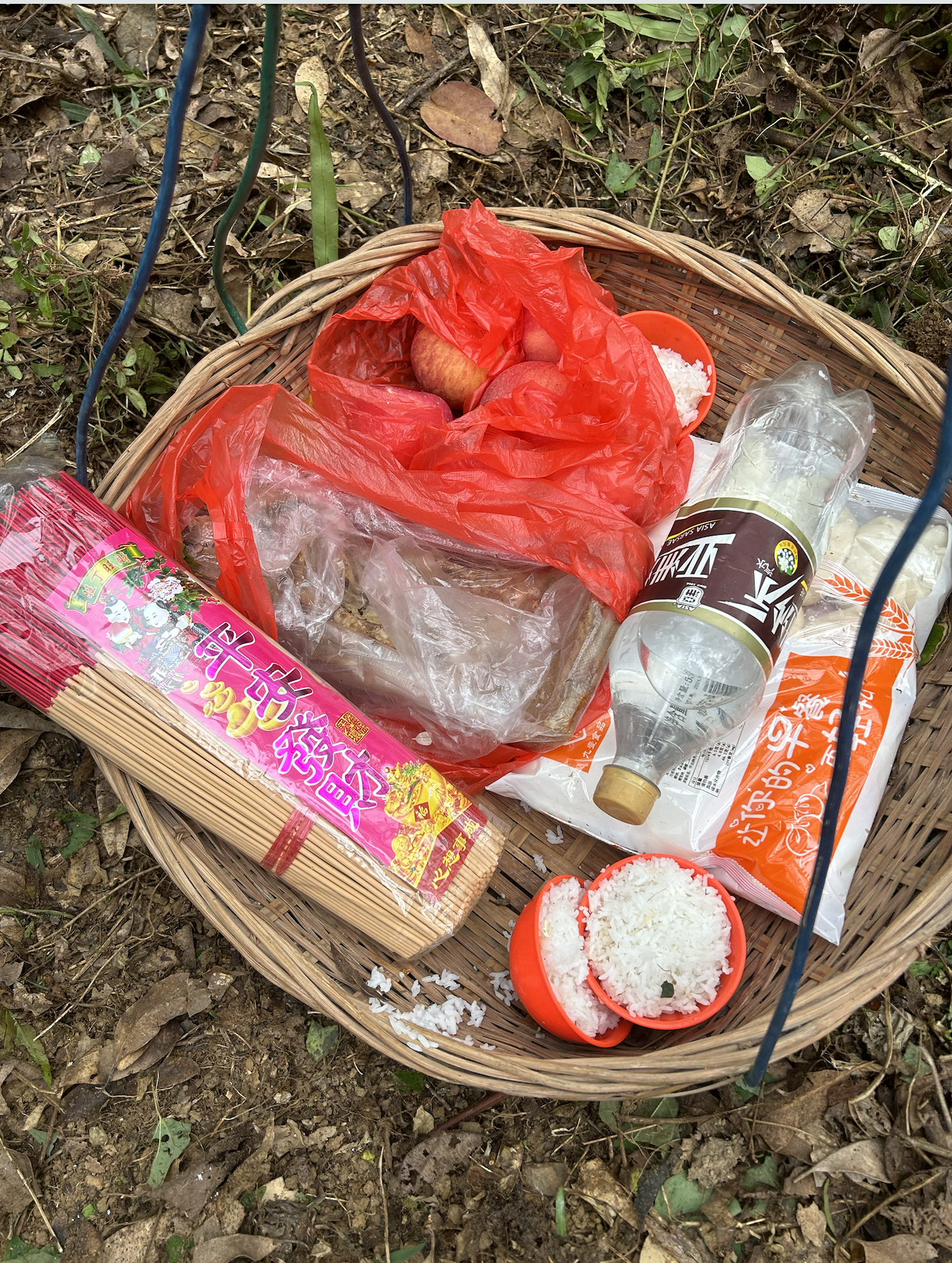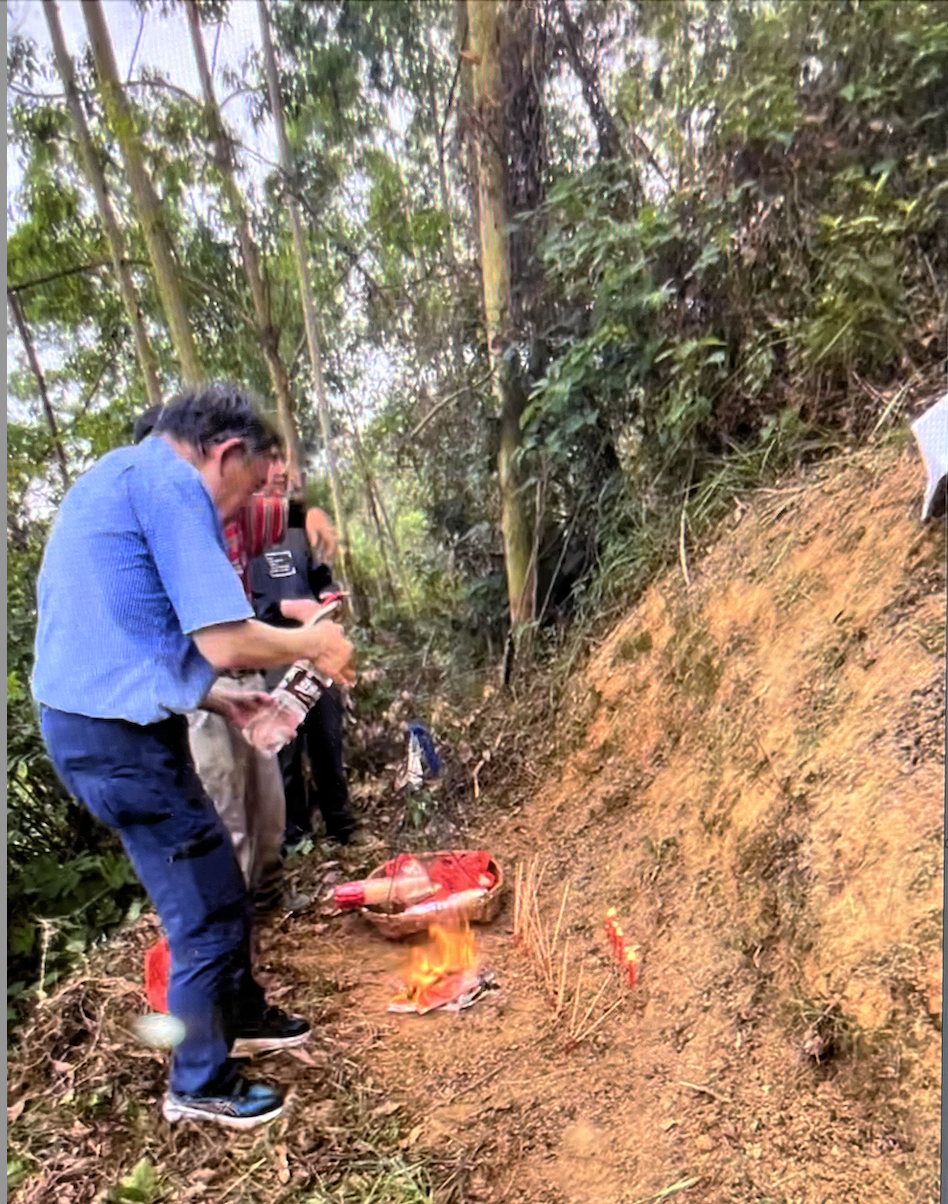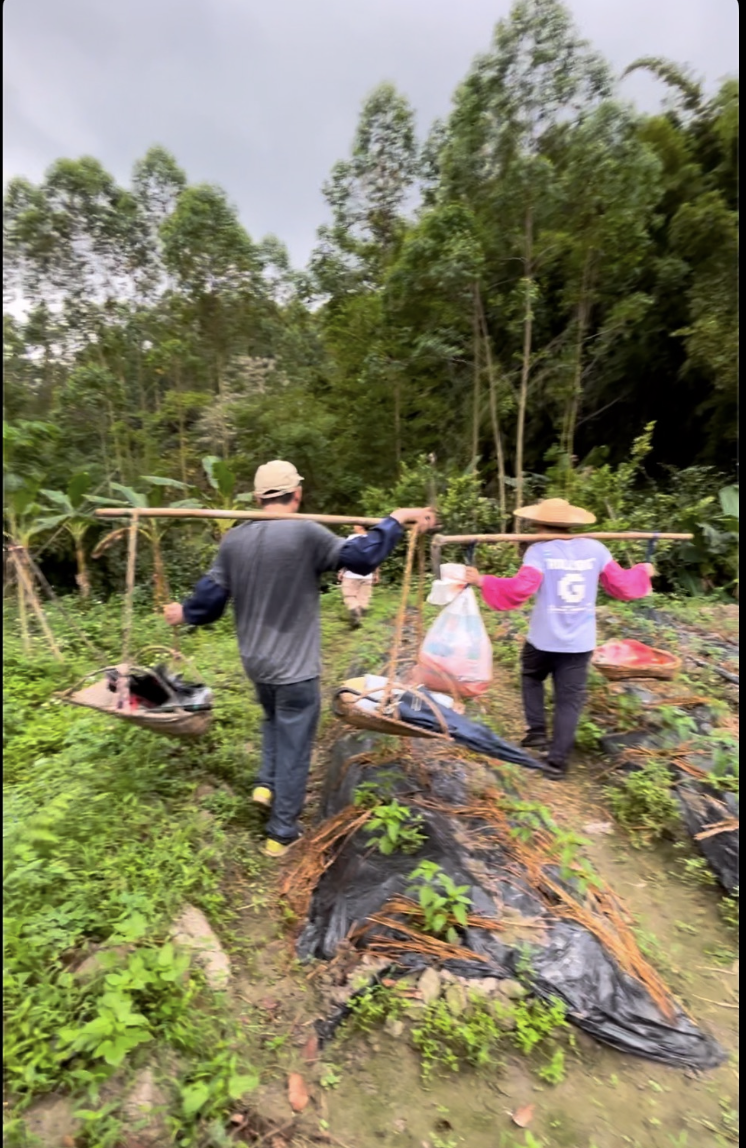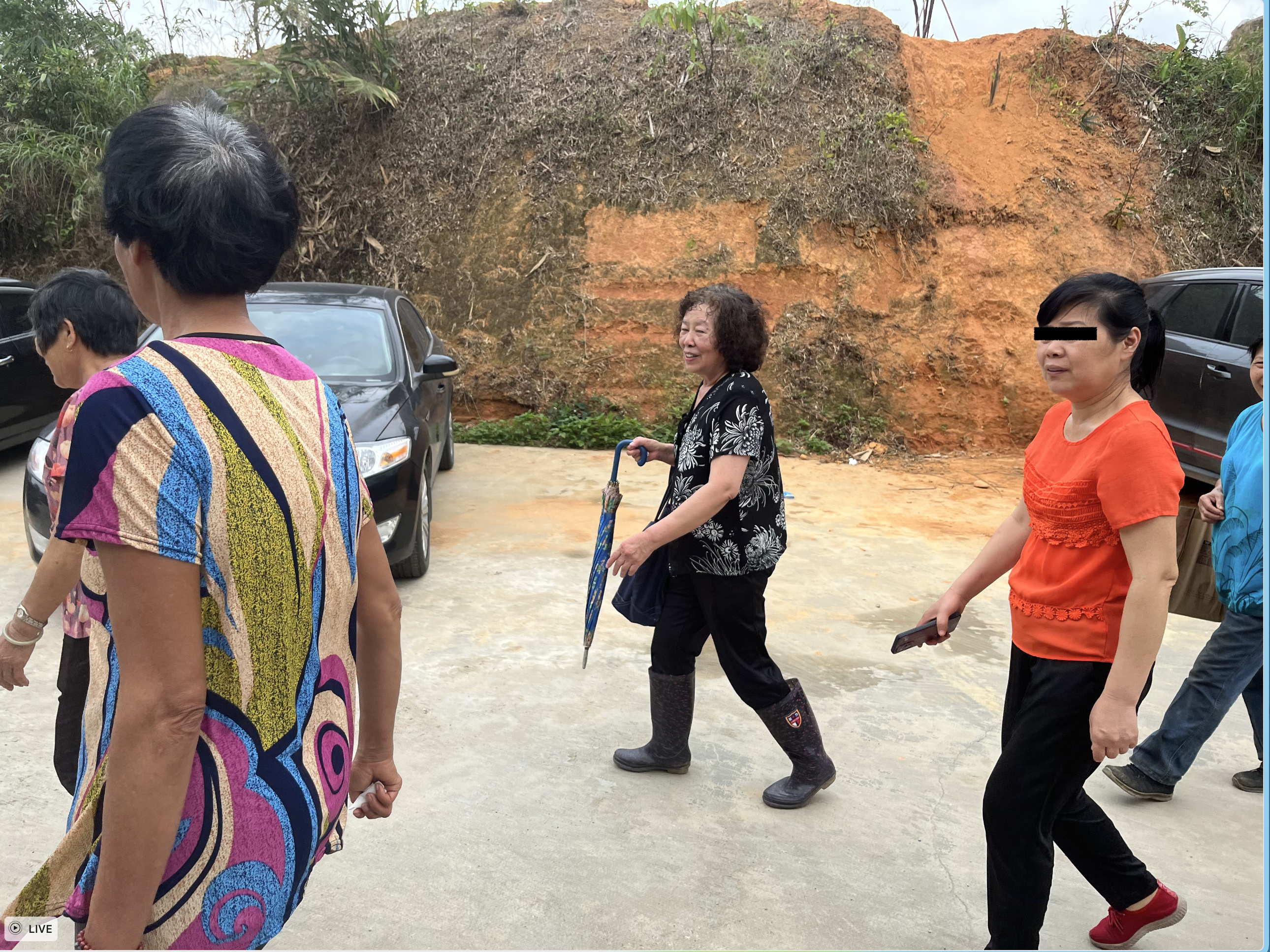|
↑
Photo 1: Off deep into the hills to honor the Ancestors! Cousins and uncles and nephews sharing an ancestor from the 1700's eight or nine generations back - there are two generations in photo.
|
|
↑圖一:到深山祭祖去!這是我的堂弟和堂侄們。我們有一個曾經生活在1700年代的共同祖先,我和我的堂弟是這位祖先的第八代後人,我的堂侄們就是第九代後人了。
|
|
First, one big difference with North America, as I found out, was that this was a communal, group affair. Unlike here in North America, where Qing Ming was a single family by family commemoration of their deceased grandparents or great grandparents, at my ancestral village it was a clan by clan collective commemoration of common ancestors a number of generations back.
|
|
一開始,我便發現了一個廣東鄉村跟北美清明很大的不同:這是一場集體的活動。北美的清明是一個一個單獨家庭對已故祖父或曾祖父的紀念,而我祖籍鄉村的清明是一“房”一“房”族人對好幾代前的祖先們的集體紀念。
|
|
So what is a “clan”? To answer this we have to start with the First Ancestor. In my village and the four neighboring villages, all the people had Feng for surname, and, except for the women who married in from other villages, they were all descended from the same First Ancestor. He was a pioneer who migrated from the north 23 generations ago counting back from me, which would be over 600 years ago, in the mid- or late 1300s. At the beginning, the first few generations after the First Ancestor were all one clan, and together in one clan on Qing Ming they honored their ancestors from those first few generations. After a number of generations of population growth, however, there were too many ancestors to all honor in one day, so the people took the First Ancestor’s sons and divided themselves by who was descended from which son into clans. Each clan took one of the sons as the Clan Ancestor, and each clan separately honored the ancestors belonging to that clan. Of course, if the First Ancestor had only one son, or only one son had living male descendants at the time of clan division, then the grandsons of the ancestor would be the dividing generation. If there was only one grandson or only one grandson with living male descendants, the great-grandsons would be the dividing generation. In short, the earliest generation of ancestors that had more than one son with living male descendants was selected as the dividing generation. Then again, after several more generations, when the ancestors in a clan would become too numerous, the clan members would divide the clan again, again using the earliest generation after the Clan Ancestor that had more than one son with living male descendants as the new dividing generation. Thus, throughout centuries of division, every person belonged to a clan. I belonged to the Wen-Kai clan, and our Clan Ancestor was Feng Wen-Kai. Ancestor Wen-Kai lived eight generations ago counting from me and nine generations ago counting from my children, which meant that he lived in the mid- or late 1700s. His brothers also had clans: the Wen-Can, Wen-Zhuo clan, and Wen-Huan clans. Also, there were other clans in the villages. On Qing Ming day, these clans were the large groups in which people collectively honored their ancestors.
|
|
什麼是“房”呢?要從村的“始祖”說起。我村及相鄰的四個村子里,全部人都是姓馮的,除了從外村嫁進來的婦女們,都可以追溯到同一位始祖。他是一位從我數起二十三代前即六百多年前,大約1300年代後期或1400年代早期時,從北部遷徙下來的開墾者。開始時,始祖之下的頭幾代就是一個房,清明日都一起拜祭他們那幾代的共同祖先。但之後,經過了若干代的繁殖後,祖先人數變為太多,一天拜祭不了,他們就以始祖生下的幾兄弟為分界,分為幾個房,每個房以其中一個兄弟為“房祖”,各房各自祭拜屬於該房的祖先。當然,如果始祖只有一個兒子,或分房時只有一個兒子有尚存男性後代,就以始祖的孫子一代為分界。如果孫子也只有一個或只有一個孫子有尚存男性後代的話,就以曾孫一代為分界。總之,選擇最早不但有幾兄弟,而且幾兄弟都有尚存男性後代的一代祖先為分界。再過若干代後,當有一個房的祖先人數再次變為太多時,房成員們又會把房祖之後最早有尚存男性後代的幾兄弟的一代祖先為新的分界,再次分為幾個房。這樣一路分下來,每個人都屬於某個房。我所屬的是文開房,房祖是馮文開。文開祖從我本人往前數是八代前,從我子女數是九代前,這就意味文開祖生活於1700年代中期或後期。他的兄弟也有房:文燦房、文灼房、和文煥房。鄉里還有其他的房。清明節那天,這些房就是人們集體祭祖的大群體。
|
|
Also, in North America, where those who went to do Qing Ming activities were not descendants of the same ancestor, people just went at whichever hour on whichever day close to Qing Ming that suited them, but here in China, where those who went all belonged to the same clan ancestor, people all went in the morning on Qing Ming Day, to collectively honor their ancestors with members of their own clan.
|
|
此外,在北美,因為祭祖的人們並不是同一個祖先的後代,所以人們祭祖時,怎麼方便自己一家人便怎麼在清明前後幾天中選擇方便的一天,再在那天中選擇某個方便的鐘點來祭祖。但是,在中國,祭祖的人們都是同一個房祖先的後代,所以人人都是在清明該日的晨早裡一起開始,跟同房族人集體祭祖的。
|
|
Such a communal affair would not be possible, of course, if Qing Ming were not a three day holiday in China. This way, the people who lived away from their home villages in the towns and cities had time to come back to the village, typically the day before Qing ming. Most village people nowadays either drove a car or rode a motorcycle, so the highways would often clog up with traffic jams -- the Chinese countryside would become a busy scene. Families, cousins, uncles, relatives, and neighbors, all gathered, visited, and coordinated and discussed tomorrow's matters. Besides preparing meals, the women also busied themselves preparing the next day's food offerings, the incense, the candles, the paper money and paper silver ingots, and so forth. The men sharpened their sickles, examined their hoes, and got the ceremonial wine and firecrackers ready. The village buzzed with activity.
|
|
當然,如果中國清明不是三天假期的話,這樣的大群集體活動就不可能實現。有了三天假期,住在村外城鎮的人們便有時間回到村裡,通常,人們在清明的前一天回去。現在,大多數村民都駕駛自己的汽車或摩托車,所以公路會堵車,中國鄉村的周邊熱鬧起來了。家人、堂兄弟、叔嬸、親戚和鄰居們都聚集在一起,互相探訪,協調討論清明當日的事宜。婦女們除了做飯外,還忙著準備祭品食物、香火、蠟燭、紙元寶、紙鈔票等。男人們則在磨鐮刀、檢查鋤頭、準備祭祀用的酒和鞭炮。村子裡一片繁忙。
|
|
Another big difference with Qing Ming in North America was that the graves were not in any set graveyard, but were spread out all over the hills, on inarable slopes considered before to be wasteland belonging to no one. For our clan's earlier ancestors their graves were farther from the village and more scattered up in the steeper hills, among the often wild, tall woods. In contrast, for the later ancestors, their graves were mostly concentrated in a lower undulating hillside about a mile outside the village, a naturally evolved expansive graveyard of sorts, if you will. From the feng shui stories told by my grandfather during my childhood, it seemed that the families back then who buried the older ancestors would more freely roam with the geomancers, the diviners and judges of feng shui, farther among the hills and climb higher to follow the ridges' "dragon veins", to more individualistically find the best feng shui "juncture points" (穴位) for the graves. They believed that such superior gravesite feng shui would bring better fortune and more blessings to the descendants.
|
|
另一個跟北美清明很大的不同是這些墳墓並不設在某個墳場裡,而是分散在山丘上,分散在以前被認為是荒地的無法耕種的斜坡上。我房族人比較早期祖先們的墓地,離我的村莊比較遠,更多分散在比較陡峭的山丘上,很多時候是在荒野的高大樹林中。相比之下,比較近期祖先們的墓地,大多集中在距離村莊約一英里的雖然有起伏但是比較低的山坡上,可說是一個自然演變出來的一種廣闊墳場吧。回顧我小時候聽祖父講的風水故事,似乎那些當年埋葬早期祖先的家人們更願意跟風水先生們跑更遠爬更高,來順著山脊的“龍脈”,更加個別化地尋找最好的穴位,他們相信,這種更優越的墓地風水會為後代帶來更好的福祉。
|
|
One more difference with North America was that the older graves among the wilds did not have any grave structures built over them, nor did most even have tombstones. In fact, from what I had seen, an older grave among the hills was usually just a mound of dirt, often discernible only after the lush past year's vegetation was cleared off the grave by the group's hoes and sickles, and pointed out as the grave by the group. Recognizing such graves had to be an art, a collective art, another good reason for Qing Ming in China to be a collective affair.
|
|
跟北美另一個不同之處是,早期祖先的野外古墳上面並沒有任何墳墓建設,很多連墓碑或標記都沒有。山裡我所見的多數古墳只是一堆土,通常是大伙用鋤頭和鐮刀清除了覆蓋著它的茂密植物後,被指出才能被辨認為墳墓的。這一定是一種特別技能,一種集體的特別技能,是中國清明必須集體祭祖的又一個好理由。
|
|
To make offerings to the older ancestors deep in the hills, therefore, the younger and stronger men from the clan would come together every Qing Ming in a "Mountain Graves Team". They had to trek far up into the hills, and after arriving at each grave, clear the plant growth, carry out the ceremony, and move onto the next grave. For our Wen-Kai clan, there were sixteen of these earlier ancestors on thirteen slopes spread among several hills. After finishing all the graves, team members had to also come back to the lower hill close to the village that contained the more recent graves, and join their waiting family groups to make offerings to their graves there. Thus, on the day of Qing Ming, our clan divided up into two groups: a small one of strong males who set out walking deep into the hills early in the morning, and a much bigger one of anyone not inclined to do a half day of arduous climbing and trekking with a load and clearing of subtropical undergrowth, plus women, children, and older folk, who set out by car or motorcycle for the hill close to the village late in the morning. Though there was no trekking or much climbing, from the road's arrival point at the foot of the hill they too must also cut down a year's growth of plant cover, make a path to their graves, and then clear an area around the graves to serve as the stage for making the offerings. On a per person basis, however, there was far less plant cover to clear than for those who went deep into the hills. Those families with men in the "Mountain Graves Team" would wait for the men to come back from the deep hills and then together make offerings.
|
|
所以,為了拜祭深山裡的早期祖先們,我房族人中比較年輕和比較壯健的男子便每清明構成一個“拜山隊”。他們要遠走山中,到十三個斜坡上的十六個屬於文開房比較早期的祖墳前,清除植被和進行祭拜。都祭拜完之後,他們還須回來那座靠近村莊、有著比較近期的墳墓的較低的山丘,加入等待著他們的家族人群,一起祭拜那裡的祖墳。那麼,清明日族人們便分為兩批:一小批壯健的男士,大清早便徒步出發去遠,和一大批其他任何不願意做半天攀爬、跋涉和斬鋤亞熱帶野草灌木叢等重活的人們,婦女、兒童、和老人,他們上午晚些時候才乘著汽車或電單車出發到靠近的那座山丘。雖然無需遠走或攀爬深山,但是他們也仍然要從山腳的車路到達點起,斬除一年以來的植被,開路到墳地,然後在墳地周邊清除出一片空地來作為祭拜場所。當然,按人均計算,需要清除的植被比進入深山的人們要少很多。那些有“拜山隊”成員的家庭,便會等待他們從深山裡回來才一起祭拜。
|
|
Feeling strong and adventurous, I decided to join the Mountain Graves Team. That made eleven of us this year, among whom eight belonged to our Wen-Kai clan's ninth generation, and three belonged to the eighth generation. Therefore, we had distant cousins and we had distant uncles and nephews. We shouldered hoes, and two team members each slung a load on each end of his shouldered hoe. One team member had on one end of his hoe a large shallow straw basket about two feet in diameter that contained the offerings of barbecued pork, three plastic bowls of rice, a package of white buns, a bag of apples, a large bottle of wine, and a large bundle of incense sticks, all covered and wrapped with an auspicious red plastic sheet. On the other end of his hoe he had a big plastic bag containing the sacrifice paper money, folded up three feet or so square sheets of large white paper for decorating the graves for the ceremonies, firecrackers, and bottles of drinking water for the trekkers. The other load-carrying team member carried two large flat scallop-shaped straw baskets slung from his hoe, and in them were sickles, fording boots, umbrellas, raincoats and gear for the team. When I tried carrying just one of the straw baskets afterwards, I found it surprisingly heavy, and even when carried by itself, so was the hoe -- my clansmen were strong indeed! Of course, the loads were rotated among the men and carried in shifts. By the way, the three "aged" members of the Team from the older eighth generation, I among them, were not given any loads to carry.
|
|
我喜愛挑戰,又覺得自己壯健,便加入了拜山隊。我們今年是十一個人,其中八個屬於我們文開房的第九代人,三個屬於第八代人。所以,有疏堂兄弟,也有疏堂叔侄。我們肩膀背著鋤頭,其中兩位隊友的鋤頭兩端都挑著負荷。一位隊友的鋤頭,一端挑著一個大約兩尺直徑的大淺草籃,籃裝著燒豬肉、三膠碗子米飯、一袋白包子、一袋蘋果、一大瓶酒、和一大捆香枝,全部被一塊吉祥的紅膠紙包著。他鋤頭的另一端則挑著一個大膠袋,裝著祭祀紙錢、用來祭祀時裝飾墳墓的折疊起來的三尺多寬大方塊白紙、鞭炮、及多瓶供大伙喝的清水。另一位隊友的鋤頭則挑著兩個大平底扇貝形草籃,裡面裝著鐮刀、水靴、雨傘、雨衣、及隊友們的裝備。事後我嘗試了用鋤頭只挑起一籃,發覺籃子出乎意料地沈重,而鋤頭當單獨挑起時也一樣地沈重 -- 哎,我的族人真強壯啊!當然,這些擔子是輪流各人挑一程的。順便提一句,包括我在內的屬於年長一點的第八代的三個“上了年紀”的隊友,不被給予擔子來挑。
|
|
Carrying our all, we set off walking from the front of the village, along the divided highway. Soon we crossed over and went into the fields. Then we found our own way through farm fields, wet grass, shallow marshlands, and gullies. We crossed streams balancing on single logs, with the two shouldering the loads performing what I thought were feats of both strength and balance. The first hill we came to was steep, with several nearly vertical slopes; we had to rely on stepping on the roots of plants and grabbing onto tree branches and grass stumps to crawl our way up. Those who climbed up first took the baskets and the big plastic bag that were handed up one by one, then stretched out their hands to help pull up those below. With lots of calling out and encouragement to each other, the esprit de corps and camaraderie were palpable.
|
|
攜帶著所有這些東西,我們隊從村頭步行出發,沿著高速公路走。很快我們便穿過公路,走進田野裡。我們開闢自己的路,走過田地、草地、淺澤地、和溪溝。我們踩著獨木過溪流,挑著擔子的那兩位展現著卓越的體力和敏捷。到達的第一座山丘,有幾壁近乎垂直的斜坡,要靠踏著植物根子和抓著草堆樹枝等才能爬到上去。最先上去的,接過被遞上的籃子和大膠袋後,又伸手拉下面的人,幫助他們上去。互相呼叫鼓勵,團體精神和同志情誼顯而易見。
|
|
Once we got onto a hill that had one or more graves, it was all in the woods. So even though we often followed a rough foot trail, the undergrowth of bushes, tall grass and plentiful plants made one spot indistinguishable from another as we moved along. Somehow though, the group knew when to stop and call out, "Here is Ancestor So and So!" Typically it was down a slope off the trail, with the slope facing some scenery. Then the group would climb down the slope, often having to hack a path through the shrub, grass and ferns as they did so. Then they would unleash hoes and sickles on the plant growth. Both hoes and sickles were remarkably effective on the grass, ferns and soft stemmed vegetation, though they be quite thick and tall. In particular, sickles worked well on vegetation with hard trunks, and even over ten foot tall small trees with trunks the diameter of a small cup were being felled with single well-aimed blows from the sickle. Amazingly, in no time at all, what had been a fairly dense jungle only minutes ago became a good size clearing some 15, 20 feet in diameter of bare brown earth.
|
|
一旦走進了有墓地的山裡,便全都是樹林了。雖然我們很多時沿著崎嶇粗陋的小徑走,但是灌木叢、高草叢和濃密生長的植物使得各個地方都難以區分。不過,隊伍總是知道什麼時候要停下來喊,“這裡便是某某祖!”通常,這都是在小徑側面的下斜坡,斜坡面對著某些景色。族人們便爬下斜坡,很多時要在灌木和蕨草蓬中砍一條路才能下去。然後,對付茂盛的植物,鋤頭和鐮刀就用上了。鋤頭和鐮刀鏟除草、蕨和其他軟桿莖植物都很有效,儘管它們長得又高又密。鐮刀則對硬桿莖的植物尤其有效,一個樹幹直徑有小杯子那麼大,超十英尺高的小樹,只需鐮刀精准的一刀就會整棵倒下來。相當茂密的叢林,若干分鐘後便已經被變為一片相當大的、約15至20英尺直徑的棕色泥土地和斜坡,快得令人驚奇。
|
|
↑
Photo 9: Crossing a field, off to the next hill!
|
|
↑圖九:跨越田野,往下一座山走!
|
|
It was noon by the time we got back to the main hill near the village with our clan's later ancestors' graves. Here most graves had structures built around, some even quite large, or they at least have upright tombstones. The large hillside was dotted with many groups of people, each group gathered around its grave. These were smaller groups of our clan that had divided up counting back only four or five generations, each group commemorating the graves of ancestors shared by the group members. My own smaller group shared my great grandfather as the common ancestor,and so they were my aunts, uncles and cousins with some distance, and their wives and children. Most groups had already cut paths through the vegetation from the road to the graves, and most graves already had the areas in front cleared of vegetation. Also, except for the few groups that had members in the Mountain Graves Team and were still waiting for us to join, most groups were already beginning their offerings activities. Here there were the elderly, the middle aged, young men and women, teens, children, and babies. Many had returned only this morning from outside the village, including those who lived and worked in the towns and cities, the high school students who lived in residence at the town's high schools, college students, and so forth. Like other people on the hill, after commemorating our group's deceased, we started busying ourselves around the grave asking after each other, bringing each other up to date, and sharing news about people we mutually know. At this time, those from an older generation could mingle with young people and children in a more relaxed and informal manner. The smoke from the incense, the fiery flames from the burning offering piles of paper money, paper home appliances and paper cars, the laughter of people conversing, the running children's cries of joy, and the many explosions of strings of firecrackers, all came together to weave a rich atmosphere of a festive holiday celebration.
|
|
當我們回到靠近村子、埋葬後期祖先和現代前人的主山丘時,已經是中午了。這裡的墳墓,絕大多數都有了墳墓結構,有的甚至規模很大,或者至少有直立的墓碑。大山坡上可以看到各個墓前都圍著一群人,這些都是我房族人,大家分開成為只是四至五代的群體,前往祭祀各自的前人。我所屬的四至五代群體,共以我的曾祖父為祖,所以這個群體裡的人都是我的疏堂叔嬸、疏堂兄弟,及他們的配偶和子女。大多數群體都已經從通往這山坡的馬路用鐮刀和鋤頭開闢了路徑到各自群體的墓前,亦在各墓前清除了一片用以祭祀的土地。而且,除了有成員參加了我們這個拜山隊的幾個群體還在等待我們回來之外,多數群體都已經開始祭祀了。這裡有老人、中年人、年青人、少年、兒童、和嬰兒等。很多人是從村外今晨才趕回來的,包括在城鎮工作和居住的人們、鎮裡學校住宿的中學生、大專院校生、等等。和山坡上的其他人一樣,我們拜祭了我們群體的前人後,便忙著圍在墓前互相問候交談,互通近況,分享我們共同認識的人的消息。這時,年長的一輩可以跟年輕人和兒童比較無拘束地交流。山坡上的香枝煙氣、祭祀紙元寶堆和紙傢具紙車堆等燃燒的熊熊火焰、人們交談的笑聲、奔跑著的孩子們的歡叫聲,以及不斷傳來的鞭炮爆炸聲,在這裡烘托出一片濃厚的節日慶祝氣氛。
|
|
After everyone in our Wen-Kai clan had gotten done with the ceremonies and the socializing, we all went to the big restaurant in front of the village and had a late but sumptuous lunch. Here several other clans from the village had also gathered to have lunch after the ceremonies, and again it was a festive event, with feasting and socializing among the tables and between the clans.
|
|
我們文開祖這房族人的拜祭儀式和相互之間的交流結束後,我們便都回村子去,聚集於村前的一家大餐館,吃一頓晚了些但很豐富、很熱鬧的午飯。村中有其他幾房族人今天也在這裡祭祖後聚集吃午飯,幾房族人的成員都於餐桌之間互訪交談,節日氣氛十分濃厚。
|
|
Even though it is true that, on this village Qing Ming Day, at the graves there was solemn dignity and respectful honoring, and at the more recent graves there was some nostalgia and longing especially for those recently deceased, the main current, nonetheless, was celebration. It was celebration that we had together honored our ancestors, celebration of how fine their descendants were, celebration of our blessings and happiness. Firecrackers were the highest Chinese symbols for celebration, and setting them off here was the most solid proof of celebration. Please note, in the tradition here, during the Qing Ming commemorations at the graves, there was no grieving, no moments of silence. In fact, even though I grew up in North America far away from here, at all the Qing Ming grave commemorations in North America since a young age, there had never been grieving or moments of silence. It had always been a respectful but lively atmosphere of a family social gathering event where honoring of our predecessors was done.
|
|
雖然這個鄉村的清明日的確充滿了莊嚴和尊敬,且在較近年代的墓前亦有懷舊和懷念,特別是對那些最近去世的親人的追思與懷念,但佔主流的還是慶祝,慶祝我們共同尊敬了祖先,慶祝祖先們的後人的優秀,慶祝我們的福祉。在這裡放鞭炮是最可靠的慶祝證據,因為它們是慶祝的最高象徵。請注意,這裡的傳統中,清明祭祀祖先時,是沒有悲哀、沒有默哀的。其實,儘管我在遠離這裡的北美洲長大,自小在北美參與的所有清明祭祖活動,同樣都是沒有悲哀、沒有默哀的,都是一種向前人致敬的莊嚴但熱鬧的家庭聚會氛圍。
|
|
↑
Photo 10: To the restaurant!
|
|
↑圖十:到餐館去!
|
|
My Conclusion
|
|
我的結論
|
|
After experiencing this day, I can clearly see why since little, I have always heard that taking part in Qing Ming's ancestor honoring activities brings blessings and good luck. It is not superstition; it is based on fact: the clan members bond, and it is this bonding that brings the blessings and good luck.
|
|
經歷了這一天的活動後,我清楚地明白了為什麼從小我就聽說參加清明祭祖活動會帶來好運和福祉。這不是迷信,這是有事實根據的:房族的成員們互相“感情粘結”起來了,即英語的 "bonding"。好運和福祉,就是這個“感情粘結”所帶來的。
|
|
Being together in a group and honoring common ancestors through common rituals vividly impress the fact that group members share common roots and common memories upon the members' consciousness. This vigorously activates a highly positive emotional state towards each other, and it is during this time that bonding forms. Moreover, while still immersed in this shared positive emotional state, socializing after the rituals at the grave site and feasting together afterwards, provide yet more crucial moments when bonding forms. With such bonding come mutual good will and strong warm feelings for one another. And this bonding is re-formed and reinforced every year at Qing Ming.
|
|
這一天,群成員共聚在一起,以共同的儀式來尊敬共同的祖先,把群成員們享有共同根子和共同記憶這個事實生動地展現在成員們的意識裡。這就極大地激發了彼此之間積極正面的情緒狀態,“感情粘結”便在這個時候形成了。此外,當人們仍然沈浸在這種共同的積極情感狀態中時,禮後墳前的問候交流和之後的聚餐宴會,為“感情粘結”的建立提供了更多關鍵的時刻。這種“感情粘結”所帶來的是彼此之間的善意和深厚的溫暖感情。而這種“感情粘結”是每年清明時都再形成、再加固的。
|
|
As for those strong and determined men who journey into the hills to arduously clear the growth cover and honor their common ancestors together, they bond even more -- indeed the more arduous the day the deeper the bonding. “We honor the mountain graves together, how can we not be brothers?!” Before, when I heard people say that, I could not follow their logic; it seemed a bit weird. Now I can. Yes, honoring the mountain graves together will make you brothers.
|
|
至於那些走進陡峭深山裡跋涉攀爬、清除植被、共同艱苦地拜祭遠祖的強壯堅毅男士們,他們的“感情粘結”則更為堅固 -- 其實,越艱苦便越堅固。“我們是一起拜山的,怎能不是兄弟!”以前,當我聽到別人這樣說時,我想不通他們的邏輯,好像是怪怪的。現在想得通了。對,一起拜山,就會成為兄弟。
|
|
Bonding leads to strong mutual trust, mutual help and mutual cooperation. What comes after "how can we not be brothers" is "of course I trust him!", "of course I will help him!", or "of course I will cooperate with him!" Therefore, the people who take part in Qing Ming activities enjoy the precious resources of strong trust, help and cooperation from an entire group of people. Naturally, then, they are more capable of attaining prosperity, success and happiness. This, of course, is exactly the blessings and good luck brought by Qing Ming's ancestor honoring activities.
|
|
“感情粘結”帶來堅強的相互信任、相互幫助和相互合作。“怎能不是兄弟”的之後便是“我當然信任他!”、“我當然會幫他!”、或:“我當然會跟他合作!”所以,參與清明的人們擁有一整個群體的堅強互信、互助和合作這些珍貴的資源。那麼,自然地,他們就更有能力獲取富裕、成功、和快樂了。當然,這,就是清明的尊祖活動所帶來的好運和福祉。
|
Is this why the deeper and steeper the hill the better the grave site feng shui, and the more the blessings to the descendants? It must be the deeper bonding! Wise indeed, this Qing Ming tradition...
|
|
這就是為什麼山越深越陡,墓地風水就越好,越能為後代帶來更多福祉的嗎?一定是更為深厚的‘感情粘結’帶來了這一切!智慧啊,這個清明傳統 . . . .
|
|
~ ~ ~ ~ ~ ~ ~ ~ ~ ~ ~ ~ ~ ~ ~ ~ ~ ~ ~ ~ ~ ~ ~ ~ ~ ~ ~ ~ ~ ~ ~
|
|
~ ~ ~ ~ ~ ~ ~ ~ ~ ~ ~ ~ ~ ~ ~ ~ ~ ~ ~ ~ ~ ~ ~ ~ ~ ~ ~
|
|
Please click to see:
Poem I wrote at the Village the Day After
|
|
請點擊觀看:
清明後一天我在村裡寫的一首詩
|
